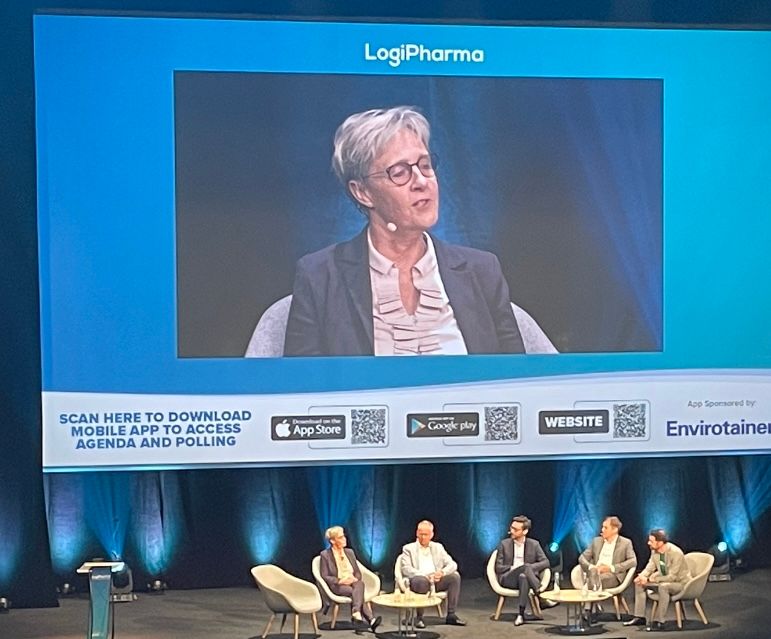LogiPharma Europe 2024: Collaboration on Behalf of Sustainability
A panel uncovers the value in meeting carbon-neutral goals by 2030.

According to Florian Schwarz, DHL’s head of sustainability and moderator of LogiPharma Europe’s presentation, “Why must our industry collaborate to reach its most ambitious sustainability goals by 2030 and what is required to meet them?” the global healthcare industry is responsible for 4.4% of total greenhouse (GHG) emissions.1 The company has set a goal of reducing GHG emissions of less than 40 million metric tons CO2e to under 29 million by 2030.
These amounts signify that “the room also has a responsibility to take action and to do something about that, if the life and wellbeing of patients is important,” he noted.
Joined my Malene Gundestrup, Novo Nordisk’s VP of logistics and distribution; Frėdėric Zwahlen, SVP global head of technical operations, CSL Vifo; Anthony Claude, head of global warehousing and distribution, Merck; and Nico Ros, chief technology officer, SkyCell, the panel set out to explore the answers to the following questions, some of which are summarized below:
- What are the current sustainability targets seen across the life sciences industry between now and 2030?
- How are producers working with partners, throughout multi-tiered supply chain networks, to gain a clear view of the carbon output of the E2E supply chain?
- What are the most effective ways that the industry can see of lowering emissions, in the short and the long term?
- What are the most significant challenges facing the achievement of these goals, and is there a contradiction between sustainability and supply chain resilience?
North Stars when it comes to the scope free sustainability between now and 2030
According to Gundestrup, Novo’s “North Star” is achieving zero emissions. already. Efforts that have started in 2019, so in reality, it is a target and ambition. As for SkyCell, the container company is reportedly on track since our base year when they started started his initiative 2020, already 90% of their emissions. Many of its sustainability efforts can be outlined in last year’s chat with Pharma Commerce.2
Merck, said Claude, is essentially aiming at reducing its Scope III-related emissions by 50% by 2030, which would include the offset of the expected year over year growth that the company is having. “We are trying to put in place an ambitious roadmap of initiatives back to the structure initiative, mainly related to shipment optimization, and complemented by tactical initiatives that would enable us to reach this ambitious target of 2040,” he said.
The origins of these initiatives
For Novo, these efforts have been in the works for quite some time. “Novo Nordisk is a very value driven company, we are delivering products to our patients. But we feel that we have an obligation and we're responsible. So we have a triple bottom line, looking into financial, social and environmental responsibilities. And the environmental part has for many years been Scopes I and II. But from the top or from the CEO, it was stated we need to be CO2 neutral by 2030. And by setting that from the top, you get that down drill down in the organization.”
Interestingly enough, as other businesses do, although the amount wasn’t specified, they have also set annual C02 travel budget, broken down by department.
Merck is also diligent on these efforts, with “sustainability embedded into everything that we are doing” by having it integrated and taught at every single layer of the organization.
Audience insight
Schwarz posted several poll questions to the audience, including what the biggest challenges within the sustainability space are to them. As one could expect, resistance from businesses, cost, mindset, and data were top of mind.
They were also polled on the main levers that can reduce emissions until 2030. There were various options that presented value, so the breakdown was as follows:
- Sustainable fuels in air or ocean: 61%
- Mode shift to air or ocean: 41%
- Waste avoidance: 22%
- Route optimization: 20%
- Optimize packaging (such as double stack, LCL): 15%
Breaking down silos
“A big discussion,” said Gundestrup, “has been with our quality, because lead time is an issue for us in changing from air to sea. And for the release time, when you say you can release when you say you can release before you ship or you can release while it's on sea—we have not succeeded in that yet. But we're still working on that. Because we see from a business perspective, that it is a risk.”
References
1. Schwarz F, Gundestrup M, Zwahlen F, Claude A, Ross N. Why must our industry collaborate to reach its most ambitious sustainability goals by 2030 and what is required to meet them? April 17, 2024. LogiPharma Europe 2024. Lyon.
2. Saraceno N. Aligning Cold Chain and Sustainability. Pharmaceutical Commerce. February 9, 2023. https://www.pharmaceuticalcommerce.com/view/aligning-cold-chain-and-sustainability